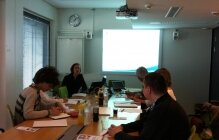incluD-ed’s first field visit in Helsinki, Finland (2/3)
Fri, 04/07/2014
- Field visit to the Finnish National Board of Education (FNBE)
incluD-ed’s second meeting was at the Finnish National Board of Education (FNBE), an agency affiliated to the Finnish Ministry of Education and Culture and responsible for developing all educational plans (national core curricula) from primary to adult education. The FNBE is also responsible for implementing national education policies, training education and teaching staff, monitoring education and learning outcomes, undertaking diverse evaluations and providing statistical data.
Aija Rinkinen, Counsellor of Education for Pre-primary and Basic Education, welcomed the network and presented the Finnish education system and its evolution in detail. She also spoke on the implementation of inclusive education in Finland and the challenges encountered, which is the main interest of the incluD-ed network partners.
Finnish Education is known for being free of charge, and having a high level of educational performance, strong individual support mechanisms and little variation between schools. Aija Rinkinen underlined that “Finland is a small country with a strange language” and therefore Finland builds on the skills, knowledge and creativity of its citizens. “The Finnish government aims to provide equal opportunities for education irrespective of age, domicile, sex, economic situation or mother tongue. We consider education as a fundamental right of all citizens”. She said that the Finnish government is convinced that basic education helps to increase both regional equality and equality among individuals.
Supporting students with special educational needs
For students with special educational needs in Finland, there are three levels of support that can be used temporarily or continuously. Early identification of learning barriers and difficulties and early prevention and support are key to the Finnish system. “The learning support received by pupils must be flexible, planned with a long-term view in mind and changed according to the needs of the pupil”, said Ms Rinkinen. In Finland different forms of support are used and support is provided as long as necessary and at the appropriate level.
|
The three existing levels of support in Finland are: 1. General support 2. Intensified support 3. Special support |
The general support level aims at high quality education for all pupils. Each teacher is responsible for supporting and guiding students and providing counselling. The teachers and school cooperate with parents in achieving the objective of pupil welfare.
The Intensified support level is provided when general support is not sufficient. At this level, each teacher is still responsible and support is provided based on a pedagogical assessment. A multidisciplinary pupil welfare team composed of parents and students will discuss measures that will be recorded in the pupil´s personal learning plan. This plan is modified when needed, but at minimum once a year. The pupils’ learning is also monitored and assessed regularly.
The Special support level is provided for pupils who “cannot achieve their growth, development or learning objectives through other support measures” and then the whole range of support measures available in basic education can be used,” said Ms Rinkinen. Special support requires a pedagogical statement and is provided in cooperation with a multidisciplinary pupil welfare team. Individual education plans are designed that include all special-needs education and any other support needed by the pupil.
“Special support is recommended to be provided in regular mainstream education whenever possible,” underlined Ms Rinkinen, while saying that “it is possible to individualize one or more subject syllabi and even to not study specific subjects”. She also said that “if the objectives set for basic education cannot be achieved in nine years, compulsory education can begin one year earlier”. This measure is especially intended for children with severe disabilities. Instruction for pupils with the most severe developmental disabilities may be provided as activity areas (motor skills, language and communication, social skills, skills in activities of daily living, cognitive skills), instead of being divided into subjects.
Reforms to the Finnish education systems
In the latest programme to improve basic education (2007-2012), a main priority was to improve the quality of teaching via national training programmes and evaluation in municipalities. The results of the evaluation showed several points Finland has to work on. The issues to be developed and/or improved are: inclusion, intensified support, supporting students at grades 7-9, transitions between education providers, student participation, co-operation with parents, studying according to activity areas, the future of our special schools and a new core curricula. She added that the entire general education system is due for reform between 2014 and 2016/2017 in terms of objectives, lesson-hour distribution, the national core curricula and local curricula involving broad-based co-operation with education experts and various stakeholders.
Ms Rinkinen concluded that the strengths of the Finnish education system lie in the clear standards, a well functioning curriculum system, a culture of cooperation and trust between pupils, teachers, schools, municipalities and government, competent teachers, high ethical orientation and commitment. Nevertheless, challenges persist – for example in the school culture, the role of students, pedagogic use of digital learning environments and the quality of learning processes and results.
For the incluD-ed founding partners it was very interesting to see how education is perceived and managed as an emblem of Finish society. The role that teachers have is highly valued and, in fact, it is very difficult to get the teachers’ degree and to become a real teacher. There is an extensive demand for this position which is as well very well paid. Schools have autonomy to build their teachers’ team, applying in depth evaluations. SEN teachers even have a higher income. However, many barriers to inclusive education still exist and are shared with other European countries.
***
incluD-ed’s first field visit in Helsinki, Finland (1/3)
incluD-ed’s first field visit in Helsinki, Finland (2/3)
incluD-ed’s first field visit in Helsinki, Finland (3/3)


















